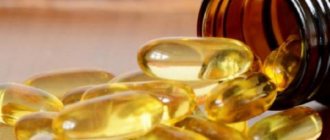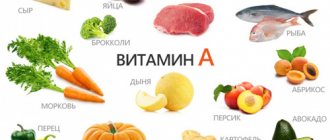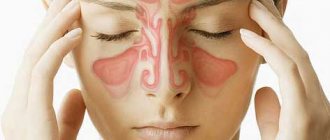Food Sources of Vitamins
If a person eats well and can afford high-quality foods rich in nutrients, then drinking pharmacy vitamins for a cold is not necessary. The following are rich food sources of vitamins:
- retinol – carrots, pumpkin, tomatoes and other red and orange plant products;
- ascorbic acid – currants and other sour berries, rose hips, bell peppers, citrus fruits;
- calciferol – fish oil, sea fish, liver;
- tocopherol – vegetable oils, nuts;
- thiamine – legumes, bran baked goods, leafy greens;
- riboflavin – cereals, eggs, nuts, dairy products;
- nicotinic acid – offal, mushrooms;
- pyridoxine – meat, legumes, cabbage.
You can get all the useful substances from foods, but it is impossible to calculate how much of a particular vitamin is consumed in food. For colds, it is better to take vitamin complexes that allow you to strictly follow the dosage prescribed by your doctor.
The pharmacy chain today offers a huge number of vitamin complexes that help prevent or quickly cure colds.
What are the consequences of a lack and excess of ascorbic acid?
Ascorbic acid has almost no contraindications. Its use should be limited to people with individual intolerance.
Vitamin C deficiency has the following symptoms:
- deterioration of hair condition;
- premature appearance of wrinkles;
- depression and apathy;
- loss of sleep;
- fatigue;
- long healing of abrasions and bruises;
- noticeable expansion of veins;
- loss of vision.
In the summer, an excess of the vitamin in combination with sunlight destroys blood cells, which leads to anemia. If you take ascorbic acid in too large quantities, kidney stones form. With increased doses, glucose will not be absorbed, which threatens diabetes in the future.
Although vitamin C cannot cure a cold on its own, taking it will relieve symptoms and speed up recovery. This is an inexpensive and effective way to prevent seasonal diseases, recommended not only for children, but also for adults.
depression and apathy;
Vitamin D
Vitamin D plays an important role in the fight against influenza. Its deficiency is a common cause of frequent human infection with acute viral respiratory infections.
Vitamin D is a natural antimicrobial element; it very actively kills not only viruses, but also bacteria and fungi. A lack of this valuable vitamin can provoke the development of severe bacterial complications.
To compensate for the deficiency of this element, constant exposure to sunlight on human skin is necessary. That is why in winter and autumn, the amount of this element in the body decreases (after all, the sun appears in the sky very rarely).
Sambucol is not just a vitamin preparation, it is a real immunostimulant.
Vitamins for colds and flu
This occurs due to a decrease in the immune system and weakening of the body's defenses.
Organic compounds against influenza
There is a group of active substances that take part in strengthening the immune system, as well as reducing the recovery period after infectious diseases.
Useful vitamins for colds, ARVI and flu:
- C – ascorbic acid;
- A – retinol;
- B2 – lactoflavin;
- B1 – thiamine;
- B6 – pyridoxine.
Important! All these vitamins are recommended to be taken for colds and flu. The substances help restore immunity, rapid recovery, copy the symptoms of ARVI, and also destroy the viral infection.
Vitamins are indicated for ARVI and influenza, as they are actively involved in the reproduction of protective cells and the restoration of the epithelium.
Dr. Mercola, Liposomal Vitamin C
Vitamin complex based on ascorbic acid Liposomal Vitamin C from Dr. Mercola. It is made using a special liposome technology. The product differs from classic ascorbic acid in its rapid and safe absorption into the intestines, the absence of unpleasant sensations at the maximum dosage. The liposome complex increases the body's resistance to viruses, normalizes metabolism, blood pressure, and strengthens the cardiovascular system.
WHO recommendations
As a result of numerous studies, the World Health Organization concluded that vitamin C has a beneficial effect on the human body during colds.
Ascorbic acid is also useful for people who regularly engage in physical activity. If you have a relaxed lifestyle, you should take vitamin C with caution. According to WHO, the daily dose should be 45-90 mg. Taking more than 100 mg per day is dangerous to health.
'Pharmacist's Notes' No matter how beneficial ascorbic acid is, it is recommended to carefully control the dosage. Daily loading doses recommended for colds can be dangerous. Like any biologically active substance, vitamin C has strict indications and contraindications that should be taken into account before using it.
We also recommend:
- About an overdose of ascorbic acid
- Is it possible to be allergic to ascorbic acid?
- The use of ascorbic acid in childhood
- About the benefits of vitamins and minerals for the musculoskeletal system
What effect does Vitamin C have on colds?
With the arrival of autumn, the number of cases of flu or colds increases. As practice has shown, if you take vitamin C for a cold, the dosage of which is several times higher than the daily norm, the effect will be the same as after taking a standard amount. The use of high doses of ascorbic acid is justified only in some cases and for certain categories of patients.
The use of high doses of ascorbic acid is justified only in some cases and for certain categories of patients.
Or does it help you recover quickly?
Nevertheless, such a disappointing conclusion, contrary to generally accepted opinion, does not at all indicate that vitamin C is useless for colds. Ascorbic acid, which helps cells of the immune system more actively cope with infection and is a powerful antioxidant, is necessary during the course of the disease itself, as it facilitates the healing process. Vitamin E also works as an antioxidant in the body.
If the task of ascorbic acid is to fight free radicals in the intercellular fluid, then vitamin E “hunts” them at the cellular level. The daily requirement for this element, found in meat, liver, lettuce, and nuts, is 10 mg.
Effective vitamins for colds
The question of the usefulness of vitamin complexes has been the subject of scientific debate for many years. There is no scientific evidence yet that the human body fully absorbs all the beneficial substances sold in tablets and capsules. But there is also no reliable information that consuming tablet vitamins does not benefit the body. Therefore, vitamin complexes are in great demand and are recommended for acute respiratory viral infections, acute respiratory infections and for preventive purposes.
Let's figure out what effective vitamins are for colds and flu that can help the patient reduce the severity of symptoms, quickly recover from illness, and prevent complications and relapses.
But there is also no reliable information that consuming tablet vitamins does not benefit the body.
List of effective vitamins
Many specialists prescribe vitamins for influenza and ARVI. This allows you to prevent further development of the disease and speed up the recovery process.
The most effective are:
- ascorbic acid (vitamin C) - has a pronounced immunomodulatory effect, prevents the spread of the virus in the body, and has a direct antiviral effect. To prevent the development of colds, a person should receive 100-150 mg of vitamin C daily. For ARVI or flu, the daily dose should be increased to 1000-1500 mg. The greatest positive effect can be achieved by using vitamin C in the early stages of the disease, when the first symptoms occur, such as nasal congestion, sore throat, and general weakness.
- Ascorbic acid contains currants, citrus fruits, and rose hips.
- thiamine (vitamin B1) - accelerates the process of regeneration of the epithelial layer of the respiratory tract, restores nerve endings. The daily dose is 1-1.2 mg, present in spinach, peas, and bread.
- riboflavin (vitamin B2) - activates the production of immunoglobulins in the event of a disease. Every day a person needs 1.1 mg of vitamin B2. Sources: eggs, dairy products, meat.
- pyridoxine (vitamin B6) - helps restore nerve endings in the mucous membrane of the respiratory tract, thereby shortening the period of manifestation of cold symptoms - cough, sore throat. The human body requires 1.5 mg of vitamin B6 daily; it is present in meat and cabbage.
- nicotinic acid (vitamin PP) - has an antiviral effect. Vitamin PP activates blood circulation in the mucous membrane of the respiratory tract. The daily dose is 25 mg. Sources: meat, offal, bread.
- retinol (vitamin A) - restores damaged epithelial cells, enhances the activity of interferon and leukocytes. 1700 mcg of vitamin A is required per day; it is present in carrots, red peppers, and green onions.
- tocopherol (vitamin E) - has a powerful antioxidant effect, protects cells from destruction, and activates the body’s protective function. The daily dose is 10 mg. Sources of vitamin E are nuts, meat, liver.
Causes of deficiency and daily requirement
Symptoms of vitamin deficiency are especially common in winter, when people lack vitamin D.
Its main source is the sun, so in spring and summer most people receive the nutrient in sufficient quantities. But during the fall and winter months, there isn't enough sunlight to ensure your body produces adequate levels of vitamin D, so getting frequent colds or flu during the colder months could mean you're deficient.
The link between deficiency of this vitamin and respiratory tract infections such as colds, bronchitis and pneumonia has been confirmed in a number of large studies.
According to health experts, a person needs 10 mcg of vitamin D per day.
How parents can choose vitamins for children over 2 years old:
Some children will benefit from organic vitamins (ideally, if they are made from eco-friendly, pure fruits and vegetables, natural yeast s.cerevisae, with the USDA Organic mark), others – synthetic ones, because Children under 4 years of age may develop allergies if they take organic vitamins.
- The dosage should not be higher than the daily norm, but should not be very low.
- Vitamins must not contain GMOs (NON-GMO VERIFIED).
- Manufacturer reliability
- The composition should not contain artificial colors, sweeteners and preservatives.
- All packaging must indicate the source of the vitamin obtained (unless it is a renatured vitamin), for example, Vitamin A (as beta-carotene from Organic Annatto).
- Vitamins intended for children must contain bioavailable forms of minerals (citrate, chelate, or natural forms - iodine in the form of KELP).
Antivitamins
A group of organic compounds that can inhibit the biological activity of any vitamins. Although there are antivitamins that have a similar chemical structure to some vitamins, their properties are completely opposite.
Antivitamins have an unusual ability - they are built into the molecules of certain enzymes and displace all useful substances from the compounds. This process is irreversible, and it leads to the fact that enzymes lose their activity. With a strong concentration of antivitamins in the body, you can get symptoms similar to hypovitaminosis. It turns out that there are a lot of vitamins in the body, but they cannot work because they have been replaced in enzyme molecules.
- Thiaminase. May destroy vitamin B1 molecules. Contained in some breeds of fish from the carp, herring and smelt families. After undergoing heat treatment, the fish loses all activity.
- Avidin. A substance that is part of the egg white and can be destroyed under the influence of temperatures.
- Ascorbinase. Found in zucchini, cucumbers and cauliflower. It collapses at 100 degrees.
It is best to cut vegetables and fruits before eating them. To make freshly squeezed juice, you should also chop everything before preparing it. Ascorbinase accelerates all oxidative reactions of ascorbic acid, and this in turn leads to the fact that the vitamin loses all activity. If you cook black currants for the winter and add sugar to them, they will not lose their properties and will retain vitamin C.
In winter, fruits and vegetables can be used frozen: sharp freezing will preserve all the vitamins and not lose their beneficial properties.
In any food, vitamins are destroyed in proportion to the time of heat treatment (the longer the time, the more they are destroyed; this applies to vitamin C and some B vitamins): all vegetables, berries and even fruits are better eaten fresh than when processed at high temperatures ; but you can choose steaming.
Interaction of ascorbic acid with other substances
Vitamin C increases the levels of benzylpenicillin and tetracycline in the blood. Preparations containing it improve the absorption of iron. Some iron products already contain ascorbic acid. With the simultaneous use of heparin and indirect anticoagulants, their effectiveness decreases.
Oral hormonal contraceptives, fresh juices, and alkaline drinks help reduce the digestion and absorption of ascorbic acid. When treated with vitamin C, the effectiveness of oral contraceptives decreases. Ascorbic acid reduces the therapeutic effect of antipsychotics.
Should children be given vitamins?
Indicated in the following cases:
- Children who have vitamin deficiency. The desire to sleep, constant fatigue, dry and flaky skin, brittle and thin hair that falls out, nosebleeds, muscle weakness. With such symptoms, it is necessary to diagnose the causes of these diseases, then prescribe vitamins;
- For young children and schoolchildren on the recommendation of a doctor;
- Children who are often, seriously and for a long time ill;
- Children whose nutrition is unbalanced;
- Children who have poor eating habits (lack of fruits and vegetables, incorrect balance of proteins, carbohydrates, and fats, excess cow's milk before the child turns 3 years old, lack of milk in any form in the diet after 3 years, excessive consumption cereals)
- Low weight and short height;
- Diet due to various allergic reactions of the body, simple reluctance to eat certain foods, low socio-economic level.
If you are worried that your child suddenly does not receive enough vitamins for the reasons listed above, then you should consult a pediatrician, and he, in turn, will assess the child’s health, his indicators, height, weight and the presence of hypovitaminosis.
Who Shouldn't Take Vitamins
Children who eat a nutritious and balanced diet.
But the exception is vitamin D. Studies have confirmed that it can reduce the likelihood of developing ARVI, osteoporosis and diabetes.
Daily dosage
The daily intake for an adult is about 70 mg, and for a child - from 30 to 50 mg. You can increase the dose if:
- increased physical and mental stress;
- pregnancy;
- increasing epidemiological risks as a remedy against colds;
- liver pathologies;
- vitamin deficiencies and fatigue;
- bleeding;
- poor wound healing.
The daily requirement of vitamin C for a healthy person depends on his age and gender. So, men, as a rule, have higher loads, and accordingly, the dose of ascorbic acid should be higher.
During the cold season, the use of ascorbic acid increases many times over. The recommended therapeutic dose for an adult is 500-1500 mg, that is, tens of times more than usual. At the same time, it is better to take it in portions, several times a day, and not for long, up to 3-5 days.
This dosage regimen will allow the body to receive the substance evenly and immediately use it to restore strength.
Despite the seeming harmlessness of vitamins, their uncontrolled use can lead to an overdose. This even applies to ascorbic acid, which is quickly excreted from the body in urine, which should be taken into account when taken daily.
Side effects are most often associated with an allergy to the vitamin or with consuming it in large quantities. In such cases, the following symptoms may be observed:
- dizziness and weakness;
- insomnia;
- Strong headache;
- abdominal pain, stool upset;
- nausea and vomiting;
- heartburn;
- allergic skin rashes.
In children, side effects can manifest themselves in the form of increased nervous excitability and aggression, itching and allergic skin rashes are often observed. If these signs appear, you should not just reduce the dosage, but stop taking the drug for some time.
The consequences of uncontrolled use can be:
- kidney problems;
- vitamin B12 deficiency;
- hypoglycemia;
- diabetes;
- tissue trophic disorders;
- copper deficiency;
- acute conjunctivitis.
What dose of vitamin C for a cold is considered harmless to the body? The daily requirement for ascorbic acid for the male half of the population is 64-108 mg, for women this figure is 55-79 mg. At the first manifestations of a cold, the recommended dose is up to 1200 mg of vitamin per day.
But it is worth remembering that abuse of this substance with a normal diet can lead to an overdose, manifested in nausea, vomiting, diarrhea, headache, insomnia and excessive excitability. In some cases, the kidneys and pancreas may be affected. Also
negatively affects tooth enamel and gastric mucosa. Therefore, to avoid possible complications, it is recommended to take it as a drink, preferably through a straw.
When using vitamin C for colds and other diseases, side effects are possible:
- irritation of the mucous membrane of the digestive system when taken orally;
- dizziness during intravenous administration;
- damage to tooth enamel due to intensive consumption of chewable tablets;
- skin itching and allergic rashes.
The maximum dose for colds is 200 mg per day.
- disruption of the nervous system;
- insomnia;
- stool disorder;
- nausea, vomiting;
- headache;
- deterioration of tissue trophism.
When symptoms appear, therapy is prescribed to eliminate it. The patient may need to undergo gastric lavage.
What can interfere with the absorption of vitamins:
- Tea and coffee kill both vitamins B and PP themselves and reduce the total content of calcium, zinc and iron in the body.
- Antibiotics lead to the destruction of B vitamins, iron, magnesium and calcium.
- Aspirin can reduce the content of vitamins B, C, A, potassium and calcium.
- Alcohol destroys vitamins A, group B, calcium, zinc, potassium, magnesium.
- Nicotine destroys vitamins A, C, E, and selenium.
- Sleeping pills prevent the absorption of vitamins A, D, E, B12, and greatly reduce the level of calcium in the body.
Three important rules of admission
- During the course of taking vitamins, you should not smoke or drink alcoholic beverages. Even one smoked cigarette completely destroys the daily portion of consumed ascorbic acid, a significant part of B vitamins and potassium. If it is impossible to quit smoking, they should be taken into account when calculating the daily dosage, increasing them to the upper limit of the norm.
- Antibiotics and B vitamins are poorly compatible, so if the doctor has prescribed antibiotics as the main tool to fight bacteria, taking B vitamins makes little sense.
- Not only bad habits can destroy ascorbic acid, but also harmless foods containing ascorbinase - cucumbers and zucchini. Therefore, when taking ascorbic acid, you should avoid eating these vegetables.
Thus, the question of whether it is possible to take vitamins during the flu should be considered completely resolved in favor of vitamins. They not only speed up the healing process, but also have a lot of pleasant side effects, which include improved condition of the skin, nails, hair and bones.
Vitamins help improve health and promote healing
It is known that a sufficient amount of all necessary nutrients in the body contributes to a kind of
How to choose the best vitamins for children
If, after visiting a doctor, you find out that your child still needs to add vitamins to his diet, the question arises: which ones exactly and where is the best place to buy them?
First, you need to know that vitamins are divided into organic
and
synthetic
.
More than 95% of the vitamins that are currently produced are synthetic. Most of them do not have the properties that natural vitamins (from food) have, because are "isolated". Since synthetic vitamins lack essential microelements, they use the human body’s own reserves of minerals, which can subsequently lead to serious deficiencies.
Organic Consumers Association
published a table by which you can understand which vitamins are natural and which are synthetic.
Vitamin A and vitamin C
occupy the first place among all chemical vitamins on the market.










